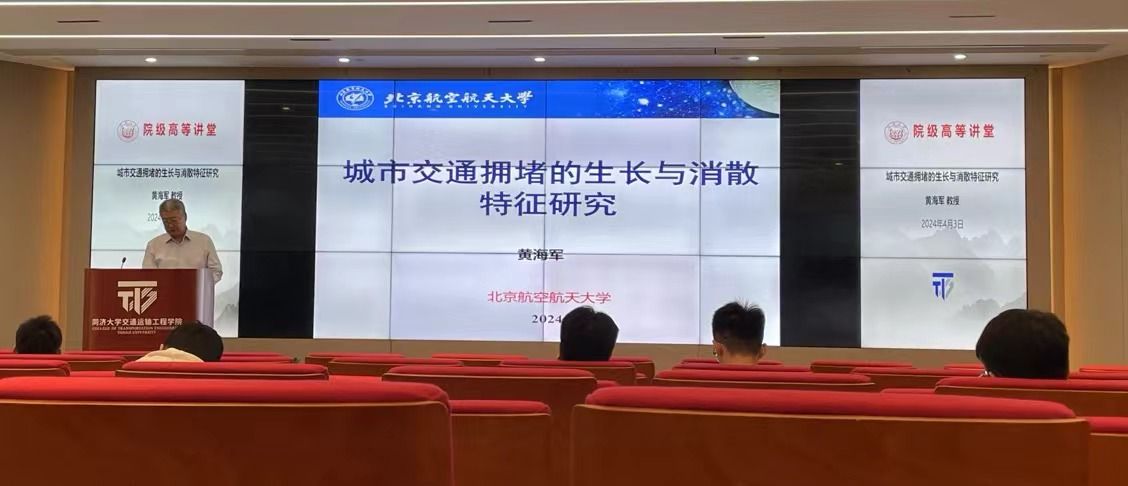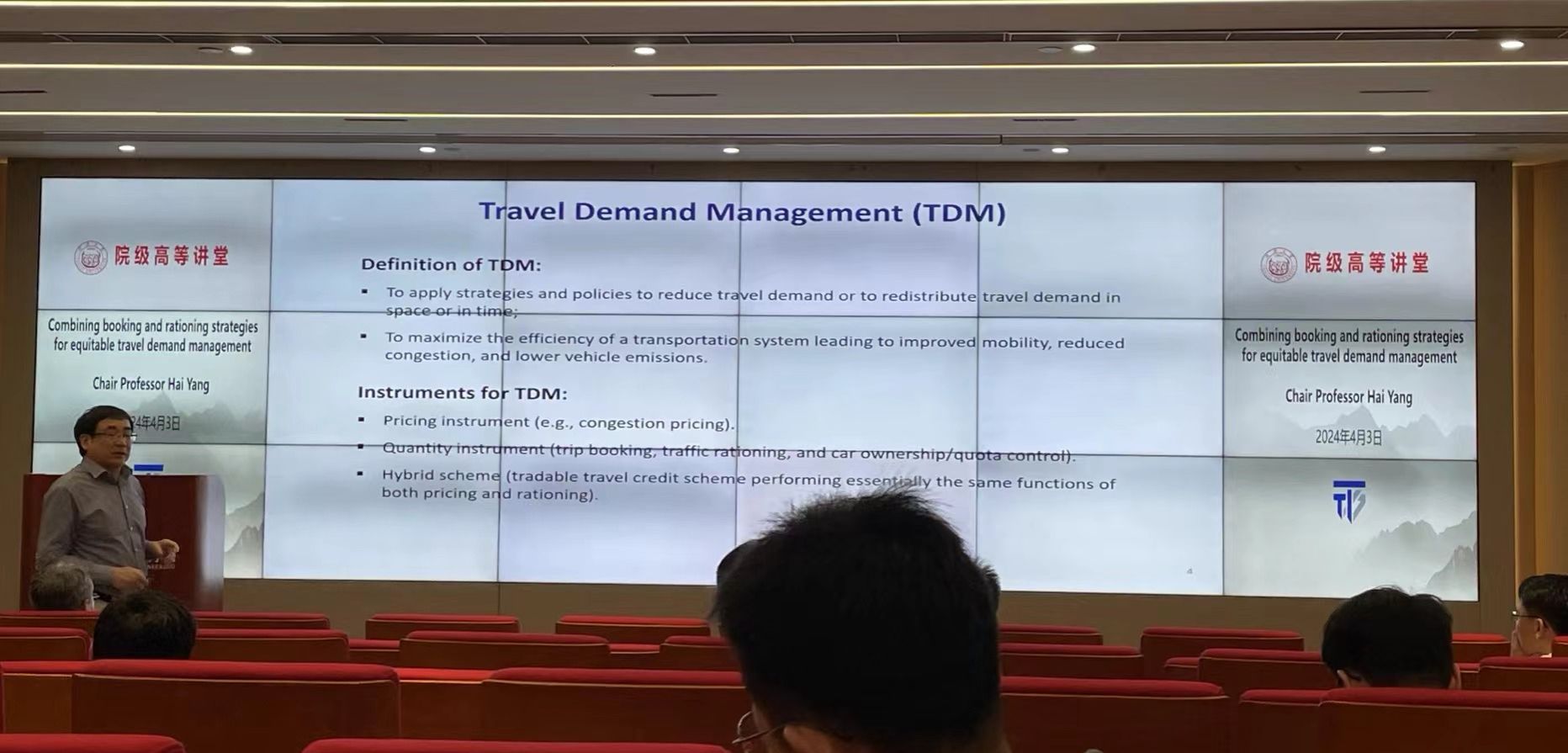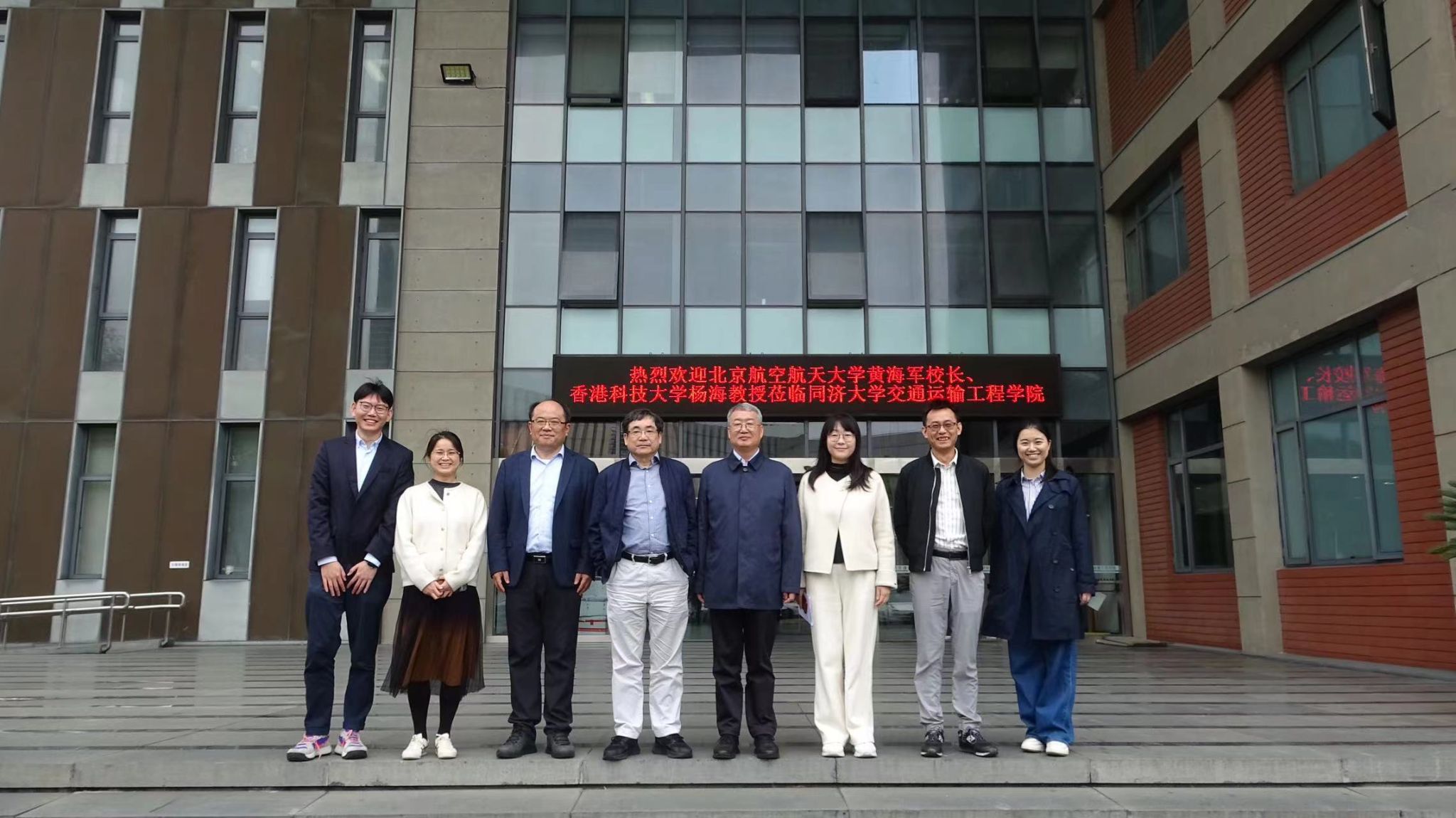On April 3, 2024, the college-level lecture hall of the School of Traffic and Transportation Engineering of Tongji University was successfully held in A103, Tongda Hall. The seminar was honored to host two distinguished guests: Professor Huang Haijun, Vice President of Beijing University of Aeronautics and Astronautics (BUAA), and Chair Professor Yang Hai from Hong Kong University of Science and Technology (HKUST).
Professor Huang Haijun initiated the event with a keynote presentation titled 'Research on the Growth and Dispersion Characteristics of Urban Traffic Congestion'. In his talk, Professor Huang introduced an evolutionary dynamics model for congestion within transportation networks, utilizing real-world data from Beijing and Shenzhen to explore the diffusion patterns of congestion, revealing its characteristic of being "easy to occur but difficult to dissipate". These findings have been published in 'Nature Communication'. He then presented a path selection model during the congestion diffusion process, sharing intriguing research outcomes such as the diversity of instantaneous shortest paths during rush hours and how real-time shortest paths tend to have shorter travel times compared to other routes. Lastly, Professor Huang discussed the completion and acceptance of a major project funded by the National Natural Science Foundation of China, highlighting the abundant achievements of his research team and providing valuable experience and suggestions to the young scholars attending.


Professor Yang Hai delivered a lecture themed 'Combining Booking and Rationing Strategies for Equitable Travel Demand Management'. He explained that booking and rationing are common Travel Demand Management (TDM) strategies used to mitigate negative externalities caused by excessive travel demand exceeding supply, aiming to achieve goals such as reducing air pollution. While booking allows drivers to reserve certain areas or lanes/roads during specific periods, rationing restricts vehicles whose license plate ends with a designated number from entering urban areas or city centers during peak hours. However, previous studies have examined and implemented these strategies separately. Professor Yang introduced a novel combined strategy of booking and rationing to realize efficient and equitable TDM. This strategy can be formulated as a linear programming problem in general networks, enabling traffic flow allocation while maintaining fairness, efficiency, and flexibility in individual choices.


The following day, Professor Yang Hai was invited to participate in an academic exchange with the Magic Research Group at Tongji University. Attendees included Professor Yang Hai from HKUST, Professor Ma Wanjing, Professor An Kun, Associate Professor Wang Ling, Associate Professor Yu Chunhui, Special Appointment Researcher Li Can, and students from the Magic Research Group.
During the exchange, Professors Yang Hai and Ma Wanjing engaged in an in-depth discussion comparing the curriculum differences between HKUST's School of Civil and Environmental Engineering and Tongji University's School of Transportation Engineering. Professor Yang suggested that transportation students should broaden their horizons by studying operational research, microeconomics, computer science, and mathematics alongside traffic theory to better address the challenges posed by this interdisciplinary field.
Professor Yang Hai further shared his views on the development of artificial intelligence technologies. He opined that tools like ChatGPT could provide conveniences such as language refinement for researchers, but over-reliance on such tools for solving academic problems might limit innovation and contributions.
Subsequently, Professor Ma Wanjing introduced each doctoral and master student from the Magic Research Group to Professor Yang Hai, detailing their research topics and facilitating discussions. Professor Yang provided invaluable guidance on the significance, feasibility, and methodology of each student's research topic, emphasizing the importance of forward-thinking in academic research. Students actively raised questions, which Professor Yang answered patiently. Using personal experiences, he highlighted that to accurately predict future trends and enhance the practical significance of research, it is crucial to read extensively, accumulate knowledge, engage in frequent thinking and communication, and understand research across different fields to gain deeper insights.
The academic exchange concluded with the members of the Magic Research Group expressing their gratitude to Professor Yang Hai. Professor Ma Wanjing expressed his hope for more profound academic exchanges and collaborations between Professor Yang's research group and theirs in the future.
